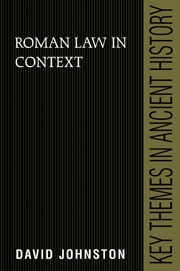3 - Family and inheritance
Summary
This chapter gives a sketch of the Roman family, slaves, and succession.
THE FAMILY
Paternal power
Roman law divided free citizens into two classes: those who were independent (sui iuris) and those who were dependent on another (alieni iuris). The Roman family was patriarchal: all power was vested in the paterfamilias, who was the senior male ascendant. So a child (at least as long as he or she was legitimate) was subject to the power of his or her paterfamilias, whether father, grandfather or great-grandfather. Paternal power (patria potestas) was in principle lifelong, so that in principle a man who had already become a grandfather might still be subject to his father's power, and become independent only late in life.
It is true (as we shall see below) that there were ways of mitigating the consequences of the fact that all power was vested in a (possibly) elderly male. None the less, this was power of an extraordinary degree, and for those subject to it represented impotence of an extraordinary degree. Patria potestas goes back at least to the Twelve Tables (c. 450 BC), and it is clear that in the early republic the powers of the paterfamilias were extreme: a power of life and death over those in the family; power to decide whether newborn babies should be accepted into the family or exposed; power to sell surplus children. Even by the later republic such primitive barbarisms no longer survived. But paternal power remained significant because of two much more practical considerations: the paterfamilias owned all the family property, and none of his dependants could own anything; everything acquired by them automatically vested in the paterfamilias.
- Type
- Chapter
- Information
- Roman Law in Context , pp. 30 - 52Publisher: Cambridge University PressPrint publication year: 1999

